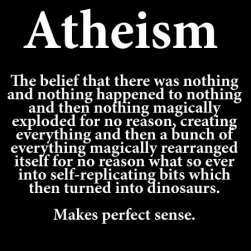


 565
Atheism: An Irrational World View
565
Atheism: An Irrational World View

by Jason Lisle

Atheists are “coming out of the closet” and becoming more vocal about their message that “there is no God.” Professor Richard Dawkins (Britain’s leading atheist) is encouraging those who share his views to express their opinion. Author of The God Delusion, Dawkins says he wants to “free children from being indoctrinated with the religion of their parents or their community.”[1] Will Christians be prepared to “give an answer” to the atheists’ claims? [2]
Materialistic atheism is one of the easiest worldviews to refute. A materialistic atheist believes that nature is all that there is. He believes that there is no transcendent God who oversees and maintains creation. Many atheists believe that their worldview is rational—and scientific. However, by embracing materialism, the atheist has destroyed the possibility of knowledge, as well as science and technology. In other words, if atheism were true, it would be impossible to prove anything!
Here’s why:
Reasoning involves using the laws of logic. These include the law of non-contradiction which says that you can’t have A and not-A at the same time and in the same relationship. For example, the statement “My car is in the parking lot, and it is not the case that my car is in the parking lot” is necessarily false by the law of non-contradiction. Any rational person would accept this law. But why is this law true? Why should there be a law of non-contradiction, or for that matter, any laws of reasoning? The Christian can answer this question. For the Christian there is an absolute standard for reasoning; we are to pattern our thoughts after God’s. The laws of logic are a reflection of the way God thinks. The law of non-contradiction is not simply one person’s opinion of how we ought to think, rather it stems from God’s self-consistent nature. God cannot deny Himself ( 2 Timothy 2:13), and so, the way God upholds the universe will necessarily be non-contradictory.
Laws of logic are God’s standard for thinking. Since God is an unchanging, sovereign, immaterial Being, the laws of logic are abstract, universal, invariant entities. In other words, they are not made of matter—they apply everywhere and at all times. Laws of logic are contingent upon God’s unchanging nature. And they are necessary for logical reasoning. Thus, rational reasoning would be impossible without the biblical God.
The materialistic atheist can’t have laws of logic. He believes that everything that exists is material—part of the physical world. But laws of logic are not physical. You can’t stub your toe on a law of logic. Laws of logic cannot exist in the atheist’s world, yet he uses them to try to reason. This is inconsistent. He is borrowing from the Christian worldview to argue against the Christian worldview. The atheist’s view cannot be rational because he uses things (laws of logic) that cannot exist according to his profession.
The debate over the existence of God is a bit like a debate over the existence of air. [3] Can you imagine someone arguing that air doesn’t actually exist? He would offer seemingly excellent “proofs” against the existence of air, while simultaneously breathing air and expecting that we can hear his words as the sound is transmitted through the air. In order for us to hear and understand his claim, it would have to be wrong. Likewise, the atheist, in arguing that God does not exist must use laws of logic that only make sense if God does exist. In order for his argument to make sense, it would have to be wrong.
How can the atheist respond?
The atheist might say, “Well, I can reason just fine, and I don’t believe in God.” But this is no different than the critic of air saying, “Well, I can breathe just fine, and I don’t believe in air.” This isn’t a rational response. Breathing requires air, not a profession of belief in air. Likewise, logical reasoning requires God, not a profession of belief in Him. Of course the atheist can reason; it’s because God has made his mind and given him access to the laws of logic—and that’s the point. It’s because God exists that reasoning is possible. The atheist can reason, but within his own worldview he cannot account for his ability to reason.
The atheist might respond, “Laws of logic are conventions made up by man.” But conventions are (by definition) conventional. That is, we all agree to them and so they work—like driving on the right side of the road. But if laws of logic were conventional, then different cultures could adopt different laws of logic (like driving on the left side of the road). So, in some cultures it might be perfectly fine to contradict yourself. In some societies truth could be self-contradictory. Clearly that wouldn’t do. If laws of logic are just conventions, then they are not universal laws. Rational debate would be impossible if laws of logic were conventional, because the two opponents could simply pick different standards for reasoning. Each would be right according to his own arbitrary standard.
The atheist might respond, “Laws of logic are material—they are made of electro-chemical connections in the brain.” But then the laws of logic are not universal; they would not extend beyond the brain. In other words, we couldn’t argue that contradictions cannot occur on Mars, since no one’s brain is on Mars. In fact, if the laws of logic are just electro-chemical connections in the brain, then they would differ somewhat from person to person because everyone has different connections in their brain.
Sometimes an atheist will attempt to answer with a more pragmatic response: “We use the laws of logic because they work.” Unfortunately for him, that isn’t the question. We all agree the laws of logic work; they work because they’re true. The question is why do they exist in the first place? How can the atheist account for absolute standards of reasoning like the laws of logic? How can non-material things like laws exist if the universe is material only?
As a last resort, the atheist may give up a strictly materialistic view and agree that there are immaterial, universal laws. This is a huge concession; after all, if a person is willing to concede that immaterial, universal, unchanging entities can exist, then he must consider the possibility that God exists. But this concession does not save the atheist’s position. He must still justify the laws of logic. Why do they exist? And what is the point of contact between the material physical world and the immaterial world of logic? In other words, why does the material universe feel compelled to obey immaterial laws? The atheist cannot answer these questions. His worldview cannot be justified; it is arbitrary and thus irrational.
Conclusions
Clearly, atheism is not a rational worldview. It is self-refuting because the atheist must first assume the opposite of what he is trying to prove in order to be able to prove anything. As Dr. Cornelius VanTil put it, “[A]theism presupposes theism.” Laws of logic require the existence of God—and not just any god, but the Christian God. Only the God of the Bible can be the foundation for knowledge (Proverbs 1:7; Colossians 2:3). Since the God of Scripture is immaterial, sovereign, and beyond time, it makes sense to have laws of logic that are immaterial, universal, and unchanging. Since God has revealed Himself to man, we are able to know and use logic. Since God made the universe and since God made our minds, it makes sense that our minds would have an ability to study and understand the universe. But if the brain is simply the result of mindless evolutionary processes that conveyed some sort of survival value in the past, why should we trust its conclusions? If the universe and our minds are simply the results of time and chance, as the atheist contends, why would we expect that the mind could make sense of the universe? How could science and technology be possible?
Rational thinking, science, and technology make sense in a Christian worldview. The Christian has a basis for these things; the atheist does not. This is not to say that atheists cannot be rational about some things. They can because they too are made in God’s image and have access to God’s laws of logic. But they have no rational basis for rationality within their own worldview. Likewise, atheists can be moral, but they have no basis for that morality according to what they claim to believe. An atheist is a walking bundle of contradictions. He reasons and does science, yet he denies the very God that makes reasoning and science possible. On the other hand, the Christian worldview is consistent and makes sense of human reasoning and experience.
Please also visit our atheism page
Footnotes
[1] “Atheists arise: Dawkins spreads the A-word among America’s unbelievers” The Guardian, October 1st, 2007
[2] See 1 Peter 3:15
[3] Christian philosopher Dr. Greg Bahnsen often used this analogy. Dr. Bahnsen was known as the “man atheists most feared.”



This page was created on 18 May 2008
Last updated on 18 May 2008
Copyright © 2007 Jason Lilse




